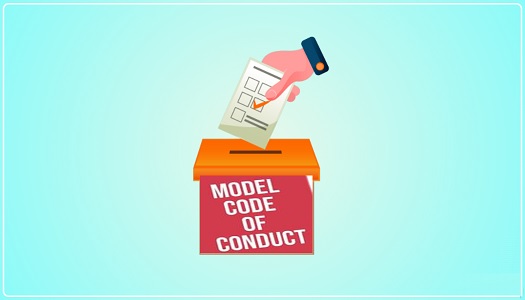
Friends, you must have seen political leaders campaigning in different ways at the time of the Lok Sabha or Vidhan Sabha elections. But can these leaders do whatever they want to get public votes? It is not so. There are some rules and regulations that define how their behavior should be at the time of the election, which is called the Model Code of Conduct. Do you know if these leaders or the workers of any party violate the guidelines given in the model code of conduct, then people can report that directly to ECI, after which ECI takes action on them? But for that, we must know what is this model code of conduct?
In this article, we will try to understand various sections of the Model Code of Conduct. The contents of this article will include
- Role of ECI
- General conduct
- Meetings
- Procession
- Party in power
- Polling day
- Legality of MCoD
Role of ECI
As we know in India, be it centre or state elections, all are conducted by ECI(Election Commission of India). The model code of conduct comes into force immediately on the announcement of the election schedule by the ECI for the need of ensuring free and fair elections. During this time period, ECI becomes so powerful that all the government machinery of that area comes under their direct control. They can directly order to any IAS or IPS officer of that area and can depute officers and staff of any department of the government to election duty. If ECI finds any candidate violating the guidelines of the model code of conduct, then it can put a temporary or permanent ban on his election campaign. In worst cases, his nomination can also be canceled.
The model code of conduct was first introduced in Kerala Legislative Assembly in 1960. Later in 1962, it was also introduced in the Lok Sabha election.
General Conduct
No party or candidate shall include in any activity which may aggravate existing differences or create mutual hatred or cause tension between different castes and communities, religious or linguistic.
Very often we hear leaders of one party criticizing other parties or candidates. This criticism shall be confined to their policies and program, past record, and work. Parties and Candidates shall refrain from criticism of all aspects of private life, not connected with the public activities of the leaders or workers of other parties. There shall be no appeal to caste or communal feelings for securing votes. Mosques, Churches, Temples, or other places of worship shall not be used as forums for election propaganda.
All parties and candidates shall avoid scrupulously all activities which are “corrupt practices” and offenses under the election law, such as bribing of voters, intimidation of voters, impersonation of voters, canvassing within 100 meters of polling stations, and the transport and conveyance of voters to and from the polling station.
No political party or candidate shall permit it’s or his followers to make use of any individual’s land, building, compound wall, etc., without his permission for erecting flag-staffs, suspending banners, pasting notices, writing slogans, etc.
Everyone wants that wherever the election is held, should be conducted peacefully, so it is the responsibility of all the political parties and candidates to ensure that their supporters do not create obstructions in or break up meetings and processions organized by other parties. Posters issued by one party shall not be removed by workers of another party.
There is fixed timing for holding public meetings and processions i.e 6:00 AM to 10:00 PM, that must be followed by every party and candidate. So, no public meetings can be held after 10 PM and before 6.00 AM.
Meetings
The party or candidate shall inform the local police authorities of the venue and time of any proposed meeting well in time so as to enable the police to make necessary arrangements for controlling traffic and maintaining peace and order. If permission or license is to be obtained for the use of loudspeakers or any other facility in connection with any proposed meeting, the party or candidate shall apply to the authority concerned well in advance and obtain such permission or license. Organizers of a meeting shall invariably seek the assistance of the police on duty for dealing with persons disturbing a meeting or otherwise attempting to create disorder. Organizers themselves shall not take action against such persons.
Procession
A Party or candidate organizing a procession shall decide beforehand the time and place of the starting of the procession, the route to be followed, and the time and place at which the procession will terminate and shall give advance intimation to the local police authorities of the program so as to enable the letter to make the necessary arrangement.
The organizers shall take steps in advance to arrange for passage of the procession so that there is no block or hindrance to traffic. If the procession is very long, it shall be organized in segments of suitable lengths, so that at convenient intervals, especially at points where the procession has to pass road junctions, the passage of held-up traffic could be allowed by stages thus avoiding heavy traffic congestion.
If two or more political parties or candidates propose to take processions over the same route or parts thereof at about the same time, the organizers shall establish contact well in advance and decide upon the measures to be taken to see that the processions do not clash or cause hindrance to traffic. The assistance of the local police shall be availed of for arriving at a satisfactory arrangement.
The carrying of effigies purporting to represent members of other political parties or their leaders, burning such effigies in public, and such other forms of demonstration shall not be countenanced by any political party or candidate.
Party in power
After the election is announced, there are some restrictions imposed on the then party in power, so that they do not take any unfair advantage in election campaigns due to their official positions. After the model code of conduct comes into force, Ministers and other authorities shall not announce new schemes or projects of any kind. Neither shall they lay foundation stones of projects or schemes of any kind nor make any promise of construction of roads, provision of drinking water facilities, etc. However, the government projects which are already started must be continued under the supervision of civil servants.
Issue of advertisement at the cost of public exchequer in the newspapers and other media and the misuse of official mass media during the election period for partisan coverage of political news and publicity regarding achievements with a view to furthering the prospects of the party in power shall be scrupulously avoided.
Apart from this, the Government transport including official air-crafts, vehicles, machinery, and personnel shall not be used for the furtherance of the interest of the party in power.
Rest houses, dark bungalows, or other Government accommodation shall not be monopolized by the party in power or its candidates and such accommodation shall be allowed to be used by other parties and candidates in a fair manner but no party or candidate shall use or be allowed to use such accommodation as a campaign office or for holding any public meeting for the purposes of election propaganda.
Ministers of Central or State Government shall not enter any polling station or place of counting except in their capacity as a candidate or voter or authorized agent
Polling day
There are separate rules and regulations for all the parties and candidates for the election polling day.
On this day All Political parties and candidates shall refrain from serving or distributing liquor during the forty-eight hours preceding it.
Political parties and candidates are allowed to set their camps but they have to ensure that the camps shall be simple. They shall not display any posters, flags, symbols, or any other propaganda material. No eatable shall be served or crowd allowed at the camps. Unnecessary crowd not to be collected near their camps and near the polling booths so as to avoid Confrontation and tension among workers and sympathizers of the parties and the candidate.
Excepting the voters, no one without a valid pass from the Election Commission shall enter the polling booths.
Legality of MCoD
we learned about these many rules & regulations, but can someone be jailed for breaking these rules?
The straightaway answer to this is, NO. However if a person does such an act that violates the model code of conduct as well as comes under punishable offense under IPC, then he can be punished in that case. Model code of conduct is not a statutory law i.e. it is not passed in parliament as an act. There have been many discussions about making it enforceable in which ECI is of the opinion that it should not be made an act. Because after making it an act,(as the cases filed under the act will go to the court for the judgment) we would have to wait for the judgment of the court to announce the result of the election. And in the future, we may witness some false allegations for the purpose of delaying the election results. So it better be kept as it is.
You may refer to this video if you want the explanation in Hindi






